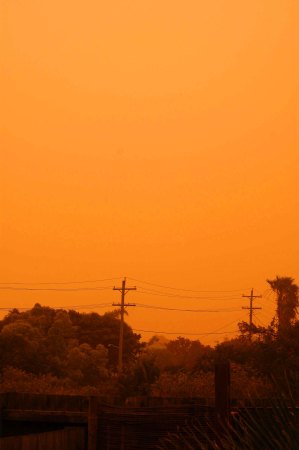Ben Harris-Roxas is an expert in health impact assessment. After waking to this view this morning in Sydney, he’s been investigating the impact of dust storms on health.

He writes:
“Sydneysiders awoke to a red glow this morning and opened their curtains to find that the city had been shrouded in a dust storm, blown in by strong winds last night. Our clothesline was covered in red muddy lumps that were similar in shape to the clothes I’d hung out yesterday.
My mother-in-law called up to instruct us not to take the baby outside. “You don’t want her breathing that stuff!”
I’m no respiratory expert, but I know that one-off exposure to dust of this nature was unlikely to cause enduring respiratory problems. A precautionary response doesn’t hurt however, and state health agencies have recommended that people stay inside.
This did make me wonder, what are the health impacts of dust storms?
Dust storms may contain plant pollens, fungal spores, dried animal faeces, minerals, chemicals from fires and industry, bacteria and pesticide residues. These all have the potential to impact on human health. This is of particular concern in countries where there is increasing desertification and weak government regulation.
The potential health impacts of dust itself are important – usually by exacerbating existing asthma. Dust storms have also led to algal blooms in some parts of the world, which in turn have a number of environmental and health impacts.
The psychological impacts of dust storms are worth mentioning as well. People looking at the health impacts of a coal mine in Wales found that it wasn’t particulates alone that could impact on people’s health. The constant noise and dust undermined their mental health as well.
Dust storms are far less constant so the extent won’t be so great, but already I’ve noticed a flurry of exclamations about the “end of the world” amongst my friends on facebook this morning. I think that if the storm goes on for several days, some of these exclamations may become semi-serious.
Dust storms remind us that what happens in the outback has a very real effect on cities, as much as we might like to pretend it doesn’t. I lived in Bourke as a kid and dust storms were not an uncommon event. Maybe they’ll become semi-regular events in the Sydney of the future as well. I’ll have to start bringing the washing in.”
• Ben Harris-Roxas works on health impact assessment at the Centre for Primary Health Care and Equity, University of New South Wales.







Crikey is committed to hosting lively discussions. Help us keep the conversation useful, interesting and welcoming. We aim to publish comments quickly in the interest of promoting robust conversation, but we’re a small team and we deploy filters to protect against legal risk. Occasionally your comment may be held up while we review, but we’re working as fast as we can to keep the conversation rolling.
The Crikey comment section is members-only content. Please subscribe to leave a comment.
The Crikey comment section is members-only content. Please login to leave a comment.